#for an overly convoluted evil scheme
Explore tagged Tumblr posts
Text
I think a lot of people critiquing the portrayal of the Rani in the recent episodes are in denial about the level of well-defined and distinct she actually was in her original appearances.
#doctor who#dr who#fifteenth doctor#sixth doctor#seventh doctor#classic who#dw: wish world#dw: the interstellar song contest#Everybody's like#she was a serious scientist!#when in her first appearance she literally made#land mines that turn you into a tree#Everybody says#she's just the Master again!#when in her second appearance she was#kidnapping the Doctor and putting on unnecessary silly disguises#for an overly convoluted evil scheme
32 notes
·
View notes
Text
So here’s something interesting that just occurred to me:
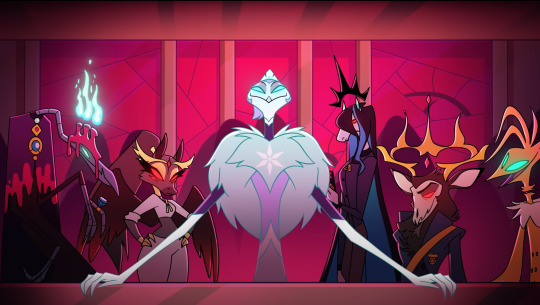
I wonder if Andrealphus suffers from classic villainous ‘complexity addiction’, and if that might end up leading to his downfall?
Because when you think about it, Andre’s big scheme this episode to take Stolas’s power feels quite a bit MORE complicated than it probably needed to be. Specifically in a way that could end up coming back to BITE Andrealphus.
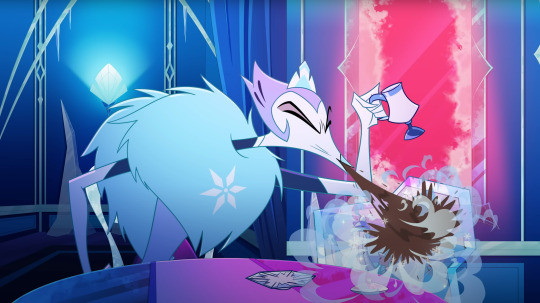
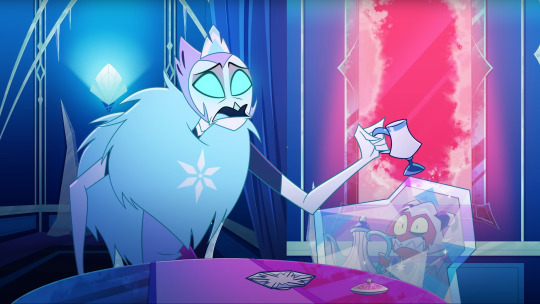
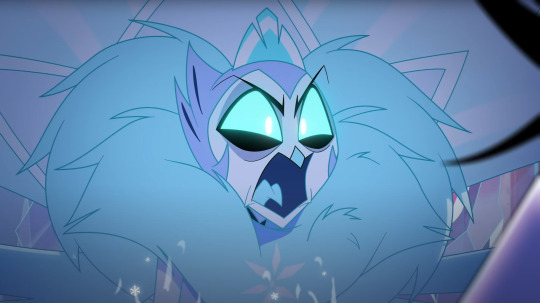
When you look back at Andre’s reaction to Stella mentioning what Stolas was specifically doing with Blitzo, it seems pretty clear that just Stolas loaning his Grimoire to Blitzo was a SERIOUS no-no for a Goetia. And almost certainly would have landed Stolas in hot shit with the law even without any outside scheming.
So why didn’t Andrealphus simply lead with that, instead of coming up with a fairly convoluted scheme of framing I.M.P. for ‘stealing’ the Grimoire and attempts on Stolas’s life, all seemingly with the goal of luring Stolas out to save Blitzo and take the fall for him, at which point Andre steps in to volunteer as a reasonable ‘regent’ for Stolas’s power and position?
Why not just let the authorities KNOW about Stolas’s illegal actions and be ready to smear him as much as possible to get him stripped of his power and position?
Now to be clear, I am NOT saying that this is ‘bad writing’ as so many who have lost all literary-analysis skill to the CinemaSins brain-worms might call it. Andrealphus ABSOLUTELY feels like the kind of character to get ‘lost in the sauce’ of his evil scheming and come up with something way more complicated than it needs to be.
What I think makes this so interesting is that Andre DIDN’T need to TRICK SATAN with this whole frameup job. So I have to wonder if THIS is what’s going to come back to… well, not so much ‘bite’ Andrealphus so much as chomp his whole ass off. Simply put, I do NOT think Satan would take kindly to being deceived in his own courtroom.
Though to keep in mind, I don’t think this would lead to Stolas somehow getting exonerated, having his position returned or any other kind of magic reset button shenanigans. For one, Satan doesn’t strike me as the kind who would go back on any of his rulings, and even if he might have been inclined, Stolas DID engage in his own deception of Satan by claiming to be some vague, nebulous ‘mastermind’ to take the fall for Blitzo. Meaning that Satan would probably tack on an extra century or two to Stolas’s ‘sentence’.
Rather, this would be less ‘exonerating Stolas’ and more ‘dragging Andrealphus under the bus.’ Getting him stripped of the power and position he got from Stolas (and maybe even his own existing position) and potentially removing him, and hopefully Stella as well, from Octavia.
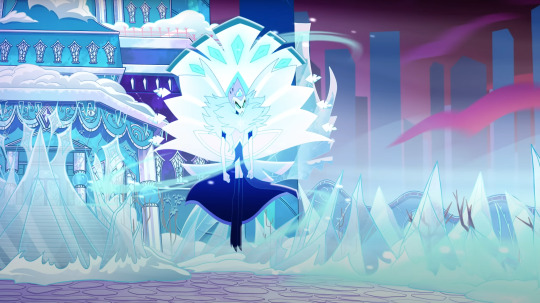
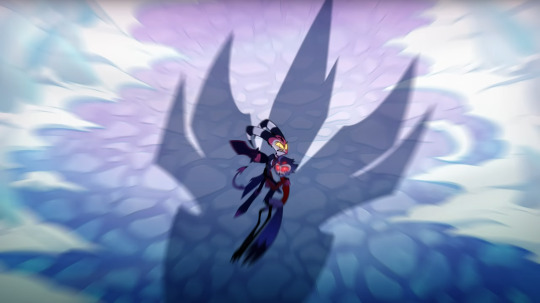
Which in turn would provide a perfect setup/reason for Andrealphus to fly into an unhinged, murderous rage at Stolas and Blitzo.
Again, I’m not sure how much if any of this will end up being relevant. Mostly just that Andrealphus getting screwed over by his own overly complicated scheme does feel fitting.
#helluva boss#helluva rambling#helluva theory#andrealphus goetia#helluva andrealphus#stolas goetia#helluva satan#helluva mastermind#helluva sinsmas
46 notes
·
View notes
Text
Sonic Big Bang 2024
Close Encounters of the Grim Kind: Chapter 3
-----------------------------------
Through the next few days, Tails discovered three things aside from his alternate dimensional research.
It took about six hours for the probe to make a round trip from him to his new pen pal and back when they tested it.
His pen pal was extremely intelligent and just as interested in the state of the Shatterverse as he was. They did not, however, want to talk about anything else, and especially not themselves.
Sonic was still refusing to share the full picture of what happened during his adventure.
Only one of these things was technically a problem, but the fox was a scientist first and foremost, and a very curious child on top of that. So, he set out to “solve” each and every one.
The first one was easy, relatively speaking. The device had been built to travel indefinitely, collecting data at manageable speeds to be analyzed later. Now that it wasn’t being used as a probe but as a simple messenger, it was no issue to redirect some of its power output away from its memory banks and towards its speed instead. He let his pen pal know what he was doing, and wasn’t surprised when they offered their own assistance, claiming that they had worked with Paradox Prism energy to know how to make movement almost instantaneous. Working off only a fraction of that power instead of the entire prism meant it would still be slower than that, but any upgrade on that front would be an improvement.
Together, they were able to drop the travel time from six hours to two, which helped immensely. It also made Tails debate crossing “Sails” off of his list of potential people, because Sonic never mentioned the pirate ever getting close enough to the Prism to learn how to do that. In the end, he kept the name on because the evidence against its presence was still flimsy.
Additionally, his unknown collaborator sent equations that would allow Tails to duplicate his own technology with Prism energy, which he used to make several more probes to send out across the Shatterverse. None of those devices were intercepted and fed data at a constant rate to his computer for him to observe and report back to the pen pal.
By the end of the week, it became routine for a familiar flash of light to appear in the fox’s shop every few hours. He’d pause in whatever he was working on to read and respond to the message as though it were an overly detailed texting app instead of the intricate probe that he’d built it to be.
[ have you found any interdimensional cracks or signs of decay? ]
– No. So far, none of my probes have registered any anomalies. –
[ good ]
[ i was unable to check for that since losing access to the shards ]
[ was worried it might return even though the paradox prism was reformed ]
– What about you? –
– Did you see anything concerning appear in your own dimension recently? –
[ none so far but ill keep you posted if that changes ]
The second problem took a little longer to work around, and Tails wracked his brain for ways to approach it without raising suspicion. He desperately wanted to know whether he was working with an Eggman above all else. It was hard to think about how their minimal exchange exploring and discussing the Shatterspace’s state of being was beneficial to any version of the mad scientist, but he’d been caught off guard by a convoluted evil scheme before and had no intention of kickstarting another with his own help.
At first, he tried to gauge his mystery partner’s interest in technology.
– I’m sorry my last message was delayed for so long. –
– I was caught up in a new invention idea and lost track of time. –
[ theres no expectation for a prompt response ]
[ im not offended ]
– That’s a relief. Do you ever get tunnel vision with your own projects like me? –
[ yes ]
– Glad to see I’m not alone! –
– What kind of projects do you like to work on? –
Asking that last question led to him being ignored for nearly half a day until one of his probes completed its semi-scheduled data returns, in which his pen pal finally sent the device back asking about its findings. There was no mention of the original inquiry; Tails got the message and didn’t bring the topic up again.
It did make him cross out Mr. Dr. Eggman’s name on his list, however – from what Sonic had told him, the man never would have been able to pass up the chance to brag about his own genius, no matter how obvious the trap.
His second attempt was more roundabout – disguising it as idle curiosity about the Paradox Prism and the Shatterverse.
– There’s still so much we don’t know about all of this. –
– My memory is a bit hazy about what happened when the dimensions split. What do you remember? –
It was admittedly a dangerous gamble. He didn’t know how many people Sonic had told about the Prism being from Green Hill, or that he himself had no recollection of the dimensions breaking apart. Someone as smart as his pen pal might be able to deduce who exactly he was – and by extension, where Sonic was – if he made a single misstep. The last thing Tails wanted was to put another target on his brother’s back even if it was from a source that probably wasn’t much of a current threat without a way to cross dimensions independently. Eggman ingenuity was never a thing to take lightly.
[ i didnt personally notice anything different until sonic first appeared ]
[ he was the catalyst for the changes in our dimension and across the shatterverse ]
Tails couldn’t help but laugh when he received that message.
– Yeah, that seems to be a constant for him. –
– He mentioned he had Prism energy inside his body that allowed him to traverse the dimensions –
– Did you ever see that in action? –
[ yes. it was remarkable to experience ]
[ the first time he used that power, he briefly shut down power in all the machines in a significant area ]
That little tidbit gave the fox pause. He remembered very well Sonic’s description of that event – and how it had happened when he was a captive of the Chaos Council. Without immediately replying, the fox instead found his notebook of names and finally removed Sails from it. Then his pencil hovered over Nine’s name for a solid minute. Sonic had mentioned that dimensional counterpart had been captured at the time as well, but had he actually been there to witness the explosion Sonic had caused?
Asking outright was likely going to go ignored again. He tapped the pencil to paper and stared at the probe as he considered how to react to this new revelation without his pen pal shutting it down.
– What was that power output like? Was it a visible phenomenon? –
Receiving a response within the average two hours made him heave a sigh of relief.
[ extremely visible ]
[ the best way to describe it was a giant rainbow hued shockwave that extended outward from his body ]
[ it was pure unfiltered prism energy with no direction or goal ]
– That sounds incredible. Did the Paradox Prism ever do something like that independent of Sonic? –
[ yes, but it looked a bit different ]
And so, the inquiry turned back around to their research without any further fanfare. As grateful as Tails was for the new hint and frustrated that it was still too vague to fully confirm his pen pal’s identity, he left those follow-up questions alone for the time being. Patience was going to be his best friend in this careful investigation.
Speaking of best friends…
Sonic had finally started to lose his manic energy regarding his friends. He wasn’t pestering them for hang-outs as often, he wasn’t spending most of his time loitering around outside Tails’ workshop anymore, and his daily runs were taking him far enough away again that sometimes it would be more than a day before any of them caught even a glimpse of him. Both Amy and Knuckles expressed their relief to see him settling back in after his solo adventure, and even Rouge made a passing comment about it when they crossed paths.
The fact that he still hadn’t told Tails about everything that had happened wasn’t as worrisome any longer, and probably would have just become idle curiosity if not for how he stumbled onto something he was obviously not meant to see.
He’d been on his way back from Amy’s house and decided to take a quick detour towards the waterfall he had first met Shadow at, hoping to tell the hedgehog that Sonic finally seemed to be doing better again. He’d flown up the cliff from the hill’s side until he reached the very top, but found himself to be the only one there today.
Then the familiar sound of a sonic boom made his ears twitch and he looked out at the landscape.
A blue streak was approaching, followed by a yellow one that was keeping pace but not gaining it. Tails watched, surprised, as his brother came to a stop at the shore of the lake below the waterfall. What was even more surprising was how Shadow caught up a second later and stood beside him instead of challenging him to a spar or another race to even the score. They began speaking, too far away for him to hear, but even from up high he could tell by their body language that it was a tense conversation.
Getting close enough to eavesdrop wasn’t an option. Both hedgehogs had hearing that would pick up his flying immediately, and he was almost certain that whatever they were talking about it would stop the instant they noticed his presence. Feeling a twinge of guilt that wasn’t enough to assuage his interest, the fox pulled out his Miles Electric and began tuning it to amplify the sound waves from below to a frequency he could hear and understand.
“….fine, Shadow, honest! Man, I had no idea you were such a mother hen.”
“It’s not about ‘mothering’, Sonic. It’s a legitimate concern.”
“Aww, you’re concerned about little old me? Never thought I’d hear you confess it outright.”
The sound of their banter made Tails’ shoulders relax when he hadn’t even realized they’d been raised. It meant that whatever they were talking about probably wasn’t all that serious after all. Or it meant…
“Stop deflecting. It’s not going to get you out of this conversation.”
…His brother was avoiding a discussion, again.
Sonic sighed so visibly that Tails didn’t even need his device to see the action. He put his hands on his hips and turned towards the lake, kicking a rock into the water as he did so.
“I really mean it, Shadow. I’m fine. I feel fine. Nothing about that has changed since we returned to Green Hill. I get why you’re worried, but there’s nothing to be worried about anymore.”
“Your brother seemed to think differently.”
“Tails?” His head whipped around so fast to stare at Shadow that all his quills bounced in sync. “What do you mean? You’ve been talking to him? What did he say?”
The other hedgehog crossed his arms, looking irritated even from far below. “Contrary to whatever belief you might hold, we keep in contact when the situation calls for it. He has expressed worry that you aren’t behaving like yourself.”
Tails’ eyes went wide. What was Shadow doing? Hadn’t he been the one who insisted that they keep Sonic out of their arrangement? And now he was blabbing about a private conversation!
“Oh, well, if that’s why you’re suddenly up in my business, don’t worry. We talked it out a while back.”
“Did you?”
“Yes, Shadow, geez. He noticed I’ve been a little…clingy, and I told him it was because I was thinking a lot about the dimensional counterparts we had to leave behind. Plus, y’know, the whole “all my friends became shadows of themselves that I thought I’d never be able to piece back together” part? Pretty obvious why I’ve been off my game the last few weeks.”
“Did you tell him about –”
“No, I didn’t, and I don’t need to.” Sonic’s tone took on a hard edge. “I’m not about to put that on his shoulders. It has nothing to do with him and he’d still feel guilty about it.”
“What happens if you ever start to deteriorate?”
Deteriorate?!
“I’m not going to, Shadow! There’s literally been no reason to worry about that! You are literally the only one worrying about that.”
“Of course I am, Sonic!” The hedgehog closed his eyes. A pained expression flashed across his face and his voice grew softer when he spoke again. “Of course, I am. You were…dying in my arms.”
Tails felt like the wind had been knocked out of him. He backed away from the edge of the cliff and clutched the Miles Electric in shock, hoping he’d misheard what had just been said. The long silence that fell between the two down below was enough of an answer. Too much of an answer.
“Listen, I’m really sorry about that,” Sonic finally said, sounding more somber than he’d been in a long time. “Truly, I am. I wish I could go back and do things differently so you never had to experience that. But I mean it when I say that I haven’t felt any different since we got back. No weird energy, no sparks, no teleporting no matter how fast I’ve been running. Nine said he pulled all of it out of me and I have no reason not to believe him. Especially not after…all of that.”
More silence. Tails curled his namesakes around himself to try and soothe his sudden shaking.
“…You really trust him that much, huh?” Shadow’s voice was unreadable, and so quiet that it was barely audible even through the device.
“Absolutely. Just as much as I trust Tails. We’d all be wiped from existence if it weren’t for him.”
Another long pause.
“Shadow, I get why you’re worried, and I promise I’ll tell you if something changes. We both said we’d be better about communicating after this, didn’t we?”
“We did.”
“Then trust me when I say I’m okay. Please?”
“…Fine.”
“Thank you.”
“You really should tell someone else about this, though. If not your brother, then one of your friends.”
“I’ll think about it. You up for a race to the ocean?”
“Perhaps another time.”
“Alrighty, then. See you later.”
A blue streak zoomed off, visible for only a few seconds before disappearing beyond the horizon. Tails found the ability to move and peeked back over the side of the cliff. Shadow was still at the lake shore, staring in the direction Sonic had run off in. His back was turned to the waterfall and so the fox couldn’t see his expression. After nearly a minute of standing there like a statue, his rocket shoes kicked into gear and he dashed off as well in a different direction.
Tails sat down right where he was, completely stunned by everything he had just heard and struggling to process it. Sonic had almost died. Sonic had been dying and hadn’t told anyone about it. How had that even happened? They’d mentioned something about “weird energy.” Was that because of the Chaos Council? The Shatterverse breaking down? Him being displaced from the dimensions in the first place and physics had finally caught up to his body?
And why on Mobius did he think Tails would blame himself if he knew?
Thoroughly shaken up, the fox flew straight home. He was still so blindsided by the information he’d unintentionally learned that he didn’t even notice the probe hovering above his desk until he collapsed into his chair after almost an hour of pacing his workshop.
He picked it up almost on autopilot, staring at the latest messages there without really reading them. It was some theory about why the other dimensions still existed with the Paradox Prism reformed, but he couldn’t wrap his head around the words no matter how he tried to distract himself with them. What did pointless theories matter when his own brother had nearly died – might still be at risk of it if Shadow’s concern was valid?
Tails needed answers and he needed them now. Screw Shadow’s terms, screw whether this mystery person was a friend or foe, screw everything that wasn’t going to tell him what he needed to know. If it ensured Sonic’s safety then he’d take any risk.
Instead of replying, the young scientist shut the device off and pulled out its blueprints, along with the notebook he’d used to parse out the equations for how to make it travel faster between dimensions. Additionally, he recalled all of his probes that had been out collecting data. Two hours between messages was too long to wait for each reply. He needed this to be as instantaneous as his pen pal had claimed the Prism energy was capable of, and he was going to use all the energy currently at his disposal to do it.
A preliminary glance at the time told him it was early evening. He turned off or flipped over every clock and time-keeper in his space, knowing this was going to be a long haul. From the kitchen he retrieved a full pitcher of water, an entire half-pan of lasagna leftovers, and three unopened energy drinks. As each probe returned one by one in small flashes of rainbow light, Tails cracked his fingers, stretched his arms once over his head, and got right to work.
It took most of the night. By the time he shut the final panel on the device, finished charging it with all the other probes, and turned it back on, the nearest clock read nearly 3 AM when he dared to look. The fox cradled the device in his hands, thoroughly exhausted. For all the work that he had just accomplished, he knew that was technically the easiest part of this entire thing. The rest hinged entirely on his mystery collaborator.
Tails drank the rest of his last energy drink, then spent the next five minutes crafting a message that would get his intentions across without scaring his pen pal away forever.
– I know we agreed to keep this as solely a research venture but this is urgent. –
– Do you know what happened to Sonic before he returned to Green Hill? Is there a chance it could happen to him again? –
– Please. I need to know. –
He sent it out before he could second-guess the wording. Then he waited.
Nothing came back.
The fox gave it ten minutes. Thirty. An hour. Just like the very first time he’d activated the device, he was left in limbo, waiting and wondering if everything he’d worked so hard for was about to go up in flames. He knew it wasn’t just about technological limitations anymore. There was a small chance that his pen pal was asleep, but their time zones were very different and they seemed to have just as odd a sleeping schedule as he did. The radio silence was most likely an intentional one.
Eventually, out of lack of anything better to do, Tails began cleaning up his work station just to get rid of some of the nervous energy jittering through his body. He glanced at his desk for any sign of flashing lights so often it was quickly becoming a compulsion, and so he forced himself to leave the room entirely. Crawling into bed had him feeling conflicted; he was so tired and on the verge of a crash, but he was terrified that any minute the device would return and he would miss it for hours.
In the end, physical needs won. Tails passed out the moment his head hit the pillow and he drifted off into restless sleep.
20 notes
·
View notes
Text
@rad-roche NOIR TIME! Turning my assignment in very late.
Agent Phil Coulson may not be a dame, but he does have a lot or weirdly specific things in common with Nick Valentine!
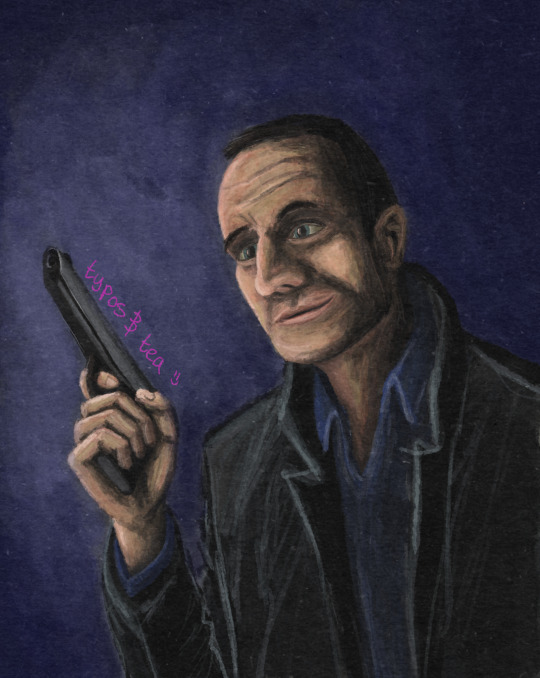
Your tutorial post on pulp covers was wonderful! But this was so many kilometres out of my stylistic comfort zone that the entire time was like agh! what the hell am I doing?.?? (And why it’s taken over a week). I found a lovely cover for reference “The Deadly September” on the archive you have linked in the tutorial.
Below is things I had to adapt to achieve a similar effect in Procreate, the reference images I used and, the worlds’s most convoluted speed-paint. (Learning new things is messy!)
⚠️THE SPEED-PAINT FLASHES QUICKLY A LOT !! ⚠️
Also I’ve listed some of the weirdly specific similarities between Coulson and Nick! so SPOILERS for Agents of Shield seasons 1-6 (I haven’t gotten around to watching 7 yet, and agents of shield isn’t MCU canon anymore anyway) and Nick’s story / far harbour in Fallout 4! (Spoilers below the speed-paint)
Procreate edits:
Totally used the back button more than I should have. I think I changed brush at least 3 times and edited the texture layers way more before it got to a point I was even remotely happy with. The brush I ended up settling with was procreate’s “Tarraleah” in the ‘artistic’ category, unaltered.
Procreate does have screen layers so was able to use that as in the tutorial, I set my chosen grunge at 90% opacity after inversion.
The contrast / brightness layer was tricker since that’s not a feature in procreate (??????), after lots of messing around I found that filling a layer with black and setting it to “soft light” mode and 85% opacity brings the paper texture I used away from the overly white tones without messing with the colour too much.
Since procreate doesn’t support per layer colour dropper, I had all of the texture layers in a folder so it can be hidden with one click, though personally I tend to guess the colour I need on the wheel rather than use colour dropper, so hiding the texture wasn’t an issue for me so much.
The colour check layer was also a black filled layer but this was set to colour mode as in the tutorial.
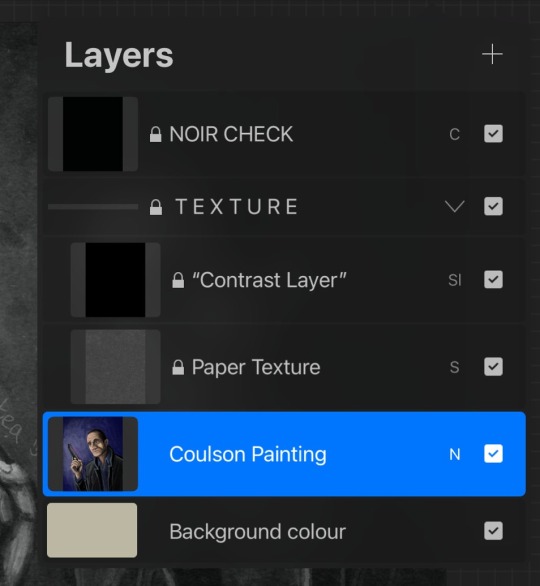
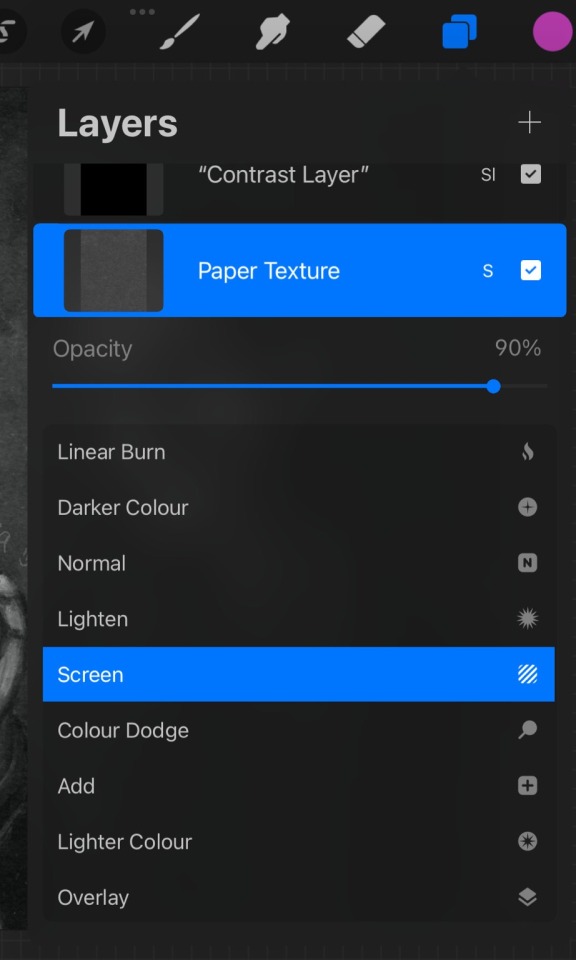
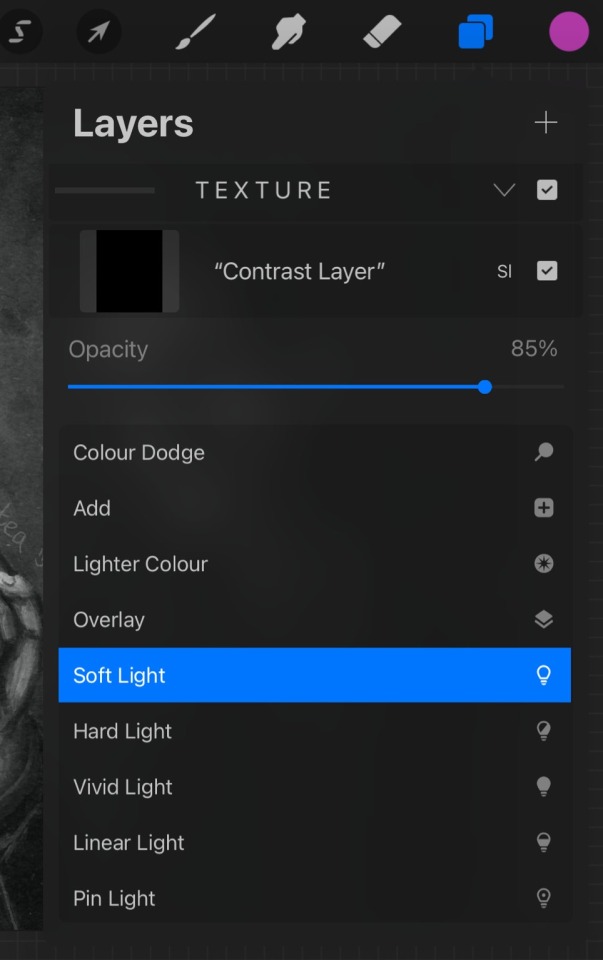
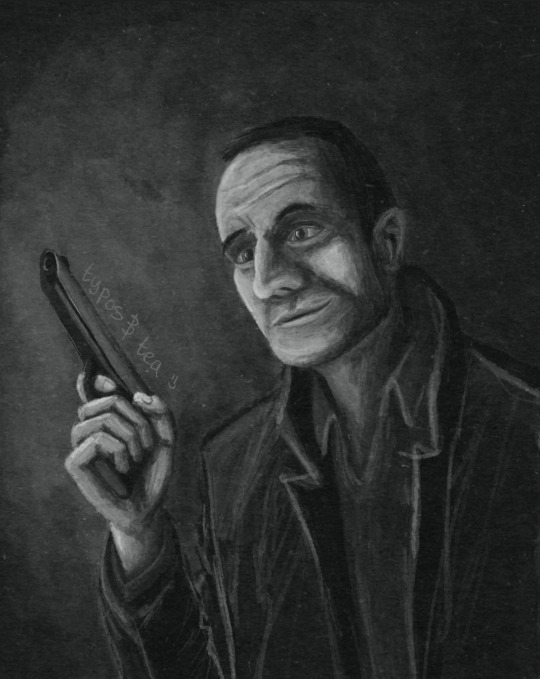
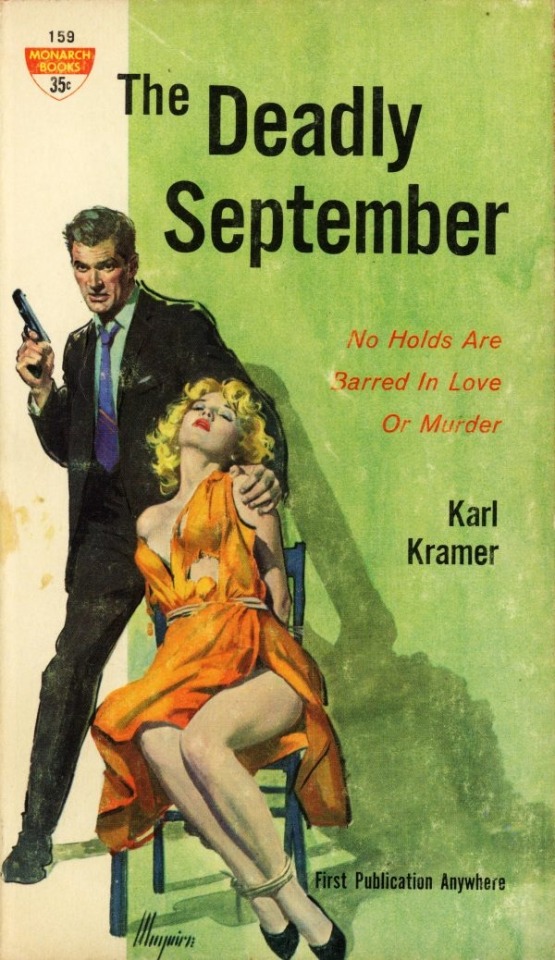
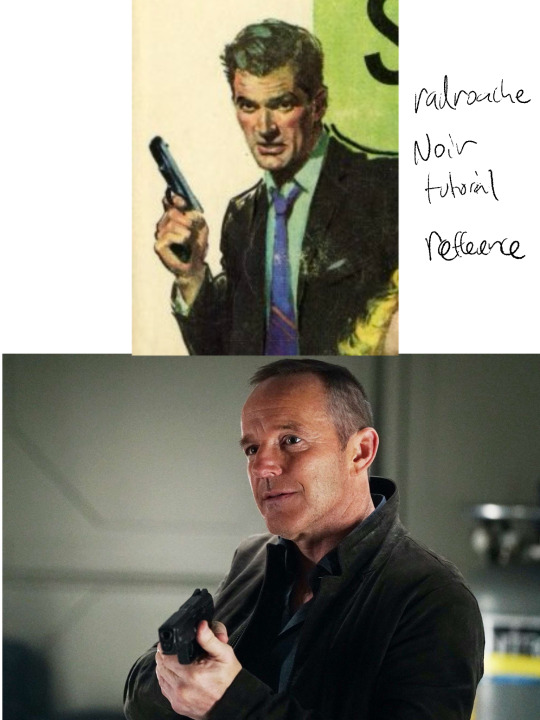
⚠️THE SPEED-PAINT FLASHES BRIGHTLY AND QUICKLY ⚠️
VVVVVVV SPOILERS FOR AGENTS OF SHIELD 1-6 AND FALLOUT 4 VVVVVVV
NICK VALENTINE AND AGENT COULSON SIMILARITIES (in my opinion):
Good people at heart
Multiple life shattering, personality altering crisis each.
Experimented on against their will by a group with highly advanced technology resulting in their unethical resurrection. Institute for Nick and Fury’s project TAHITI / Guest Host for Coulson.
Consciousness placed into a Synth / Life Model Decoy after their death against their will (LMDs are marvel’s version of synths with all the ‘is it a person’ and ‘the infiltrators are ruining our organisation’ that come with that) both are in highly modified unique Synth/LMD hardware
Both have killed an enemy they have been hunting for years for nothing but revenge, Eddie Winter for Nick and Ward for Coulson. (Though nobody stays dead in agents of shield)
Part of the plot requires entering a simulation with other peoples memories. DiMA’s memories for Nick and the Framework for the shield crew.
A partner that they can’t see because one of them was murdered as collateral damage. Jenny for Nick, and Coulson is the dead one for Audrey (the cellist)
Betrayed at a great personal cost by the organisation they were upholding when the org. Is revealed to be corrupt/evil. Police being in on Winter’s scheme for Nick and shield being hydra for Coulson.
Key Mission requires strapping them into a memory machine and poking around their brains/memories. Nick with kellogg’s memories and Raina’s need of Coulson’s memories from after he died in New York (though Coulson’s is a lot more traumatic on account of him being human at the time and marvel’s memory machine being painful)
Intentional memory loss forced on them by a third party. Nick’s institute knowledge and Coulson’s unawareness of his resurrection by Fury.
So much trauma, they can’t catch a break.
#followed an excellent art style tutorial#despite raging for a majority of the learning process I’m actually really happy with how this turned out and also that I didn’t yeet iPad#hmmm idk what old marvel tv fandom is like but I’ll tag him anyway#agents of shield#agent coulson#phil coulson#procreate#typos! art tag
13 notes
·
View notes
Text
play stupid games/win stupid prizes (The Inhertance Games, 1,136 words, Teen, 2/? chapters)
Faking Emily Laughlin's death was never going to be easy.
Grayson didn't have a choice though.
To say he had agreed to the terms would be an overly generous fib—implying a level of self-control and ability of saying ‘no’ to her he not even on his better days possessed—but the deal has been made. He had promised to help her disappear.
After all, it’s the least she deserved. It’s the least his family deserved. Grayson had tried other ways.
He had failed in other ways.
He had failed to reconcile these two. He had failed to stop his family from mattering so damn much. He had failed to stop loving her and her way of seeping into the cracks and coaxing convoluted systems open from the inside. He had failed to keep everyone safe on their separate planes of existence—
But he was ready to pay the price for that.
Grayson would have died for both of them. When Emily finally found a solution half as drastic, there were no further questions asked.
He took to executing this scheme of lesser evil with a determination that surprised even himself, with a ferocity and meticulousness that threatened to consume his very being. Grayson didn’t mind it though. He got to keep them both. He got to keep his family and he got to keep her love, and there was nothing else in this world that would have mattered.
The complications did not. The resources he had to burn in the process of making her into a new person, whose identity he would never know, did not. The violent ache in his chest—when she smiled at him, eyes alight with a kind of hunger he could never fully comprehend or see again once she was gone—did not.
None of it mattered. There was no backtracking. No loopholes. Grayson Davenport Hawthorne was a man of his word, and a deal was a deal.
[read the rest on AO3]
#the inheritance games#the final gambit#grayson hawthorne#emily laughlin#miaraculous writing#apparently looking at your ao3 after a drink and grating your teeth that you didn't post all year makes you do this#I need to get better at not being an overachiever perfectionist so here we are#not beta read AND not all pre-written. the introverts' definition of living dangerously. Jameson would mock me so bad
13 notes
·
View notes
Note
Heyo! It's the mod for the character known as 'Lyra'... I hope you can hear this, and that the buzzing thing is actually fixed, haha. Any idea what happened? I was the one that sent that anonymous ask and checked this blog every few months- I mean I just assumed the Mod was either taking a break from Tumblr or just quit Tumblr altogether but I'm obviously mistaken- can you see anything? Are you in your body- because you mentioned being trapped in one of your creations. Can you touch anything or just talk? The first step I feel like to finding out what happened to your Mod is finding out how to get out of wherever you are.
"Okay, good. Someone can both hear me, and is willing to help me."
"I have a small idea of what happened, but I'll have to start from the beginning."

"Do you recognize this? That small sphere is a planet from Super Mario Galaxy, and that big robot, called a megaleg, is a boss, from like, video games."
"Let's set the scene. A magic ghost dog from an evil dimension stole my time-stopping watch, and after enacting an overly convoluted scheme to get it back, we ended up in a boss battle in space on the planet in the picture. I was the boss, controlling the robot, and the dog was the player, running from the boss."
"At some point, a panel started flashing 'MOD LOST. ACTIVATING EMERGENCY PROTOCOLS.' However, I did not program that into the robot. Soon after the screen flashed, everything else flashed, and I was transported to a dark blue void."
"Luckily, the robot came with me, and had enough emergency provisions to last 6 months, giving me ample time to call for help."
"Yes, I am in my body. However, my body is stuck in the head of the robot, which is the creation I was trapped in."
"I can, in fact, touch stuff, because, as I said, I am still a physical being. This is good because there's like 6 rooms in the megaleg, and it would not be good if they all went to waste."
"I don't know where I am. There seems to be nothing anywhere, however, I think it may be interesting to find that the void is a dark blue, the same color as tumblr."
2 notes
·
View notes
Note
Honestly, I can totally see Terry Silver being a Yandere. Several types at once, in fact. A friendship Yandere, primarily - I mean, the extremes he willingly and absolutely JOYFULLY goes through to help out Kreese are just so over the top, it has to be brought up and noted.
Hello? Yes!? Not only is he entirely willing to drop everything to help Kreese concoct a, given, very convoluted plan of revenge almost immediately (not before asking him if he’s moving in or not once he spots Kreese’s luggage bag) he in fact suggests it personally and insists on enforcing it all while financing a lavish trip to Tahiti to get his depressed friend’s spirits up (literally personally drives him to the airport to drop him off 😂 ) and buying out locations for future dojos all on Kreese’s name and just seems THRILLED TO BE DOING ALL OF THIS - like, he’s genuinely getting an evil kick out of the prospect of settling a score over here for an old mate - just because someone crossed his friend in what he perceives as a mortal offense and goddamnit if his black creepy heart isn’t going to go all out on this matter to the point where his shenanigans verge on stalking, manipulation, breaking and entering and criminal misconduct, not to mention the time, effort and money it took to literally BUY a champion (Mike Barnes) that’s going to beat and intimidate poor Daniel who Silver’s gonna personally further scheme on by pretending to be his friend and mentor in order to purposefully weaken him for the upcoming tournament by playing mind games with him - and hoooo, boy, the list of madness just goes on and on with this guy. I can’t even bring it all up at once. If that ain’t the definition of an obsessive, overly loyal Yandere, I dunno what is. Yep, Terry Silver’s a dyed-in-the-bone Yandere and that’s my hot-take for today. This is a hill I’ll die on.
He’d literally help you hide a body, I swear.
11 notes
·
View notes
Text
Psycho Analysis: Evelyn Deavor
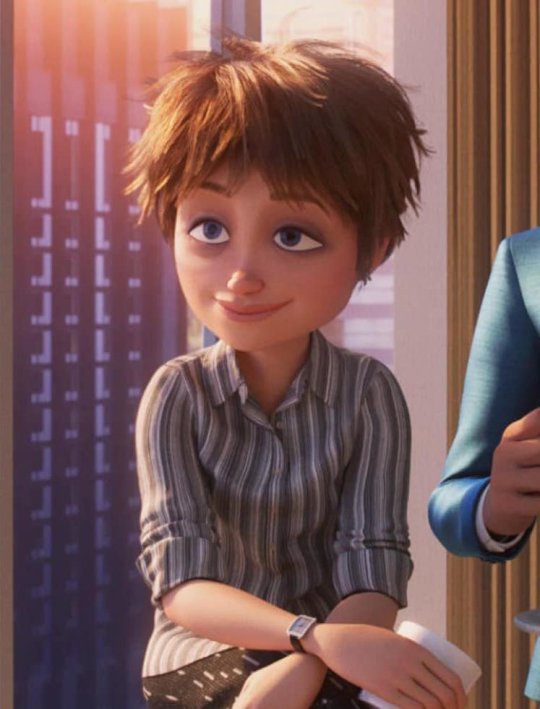
(WARNING! This analysis contains SPOILERS!)
Disney has been making a lot of films with twist villains as of late, villains who seem to be a friend for much of the movie but then, in the final act, reveal their true colors and suddenly are revealed to be the driving antagonistic force of the film. The only time this ever worked was for King Candy, because the twist tied to him wasn’t that he was an antagonist (he had been opposing the heroes and there was foreshadowing he knew more than he let on) but rather what his true nature was. Hans and Bellwether fell flat because of the inconsistencies of their characters and the lack of proper buildup beforehand, respectively, but at least this problem didn’t afflict itself on other Disney properties…
...And then came Incredibles 2. It’s a fantastic film without a doubt, and definitely a great thematic continuation of the first film that really helps to expand the world, but I cannot for the life of me find any way to defend the twist villain of this film. Evelyn Deavor is just the absolute bottom of the barrel when it comes to twist villains, because she combines all the problems of every other twist villain prior into one.
Actor: Catherine Kenner portrays Evelyn Deavor, and quite frankly it is endlessly amusing that she is yet again playing a villain who uses hypnosis to control people. Wonder if those goggles send the supers to the Sunken Place? For what it’s worth, I do think she does a good job, her performance is never bad or anything, and most of the reason Evelyn is a bad character is because of the writing, not Kenner’s performance.
Motivation/Goals: This is where Evelyn completely falls apart. She has constructed this whole elaborate false villain known as the Screenslaver, a character that actually has some pretty Interesting (though completely fabricated) motivations for committing crimes and who actually would help strengthen the themes of the film if his character was built on… all for the sake of making sure superheroes are illegal.
Now, her motivation comes from the same place as her brother’s motivation to bring heroes back: as a child, their father was gunned down by robbers when, instead of doing the smart thing and going into his safe room, he decided to try and call two superheroes on specially made phones to come save the day. Keep in mind this was after the initial ban on supers. In a way, you can kind of see where her motivation comes from; her dad was childish and stupid to think he could rely on heroes all the time.
But here’s the problem: heroes are already banned. It’s hard to comprehend exactly what she wants to accomplish; does she want heroes to get double banned? Sure, you could say that she’s just trying to sabotage her brother, who seems rather hellbent on legalizing heroes again, but considering he trusts her with a lot of the technical aspects of this there are a lot better ways she could have gone about undermining him, ways that would have been far less convoluted. Her entire plan seems to be to build them up to the top before tearing them down again, never stopping to consider how dangerous this is. These are SUPERHEROES, people who are known for finding a way against all odds to thwart evil schemes.
And going back to her creation, the Screenslaver, he actually has a far more interesting motivation, what with his big speech decrying the over-reliance on screens in society. There’s some interesting commentary there and it works well with the retro setting. This would have made a far more interesting villain, one that could actually say something about society, media, and so on while also reaffirming the positive points. It would have been the sort of bold statement that we need in a big film like this, in an age where, for good and for bad, we do rely quite a bit on screens.
Do I know for sure there would have been brilliant commentary there and not just the typical Luddite nonsense you see in political cartoons? No, I don’t, but I have faith considering the people working on the film. Do I know it would have been far better than the convoluted mess of a motivation that we got? Oh yes I do.
Personality: To her credit, Evelyn doesn’t actually change to much between her heroic and villainous personas. She’s still snarky, she still genuinely cares for her brother, she’s still brilliant save for her reliance on stupid and overly complex schemes… unlike other twist villains she doesn’t feel like two different characters between the time she’s a hero and the time she’s a villain. But I think this is where the praise has to end and veer into criticism, because with all this being said, it is obvious she’s going to be the bad guy from the moment she first appears onscreen. The reason why there’s no disconnect between her two personalities is because there never really was one; you either consciously or unconsciously pick up on there being something off about Evelyn from the get-go, which is not a problem Hans or Bellwether had.
Best Scene: Evelyn herself doesn’t really have any standout scenes, since in this exciting superhero action film she’s a non-action big bad, and unlike other non-action big bads like, say, Zemo from Civil War, her motivations are too stupid and convoluted to really get behind to enjoy her ranting. But I suppose she was technically behind the Screeslaver fight even if she was not directly there, so let’s go with that. Despite the issues the visuals caused when the film was first released, the fight is one of the most exciting moments of the film.
Best Quote: “Screenslaver interrupts this program for an important announcement. Don't bother watching the rest. Elastigirl doesn't save the day; she only postpones her defeat. And while she postpones her defeat, you eat chips and watch HER confront problems that you are too lazy to deal with. Superheroes are part of your brainless desire to replace true experience with simulation. You don't talk, you watch talk SHOWS. You don't play games, you watch game SHOWS. Travel, relationships, risk; every meaningful experience must be packaged and delivered to you to watch at a distance so that you can remain ever-sheltered, ever-passive, ever-ravenous consumers who can't bring themselves to rise from their couches, break a sweat, and participate in life. You want superheroes to protect you and make yourselves ever more powerless in the process; while you tell yourself you're being ‘looked after’, that your interests are being served, and your rights are being upheld. So that the system can keep stealing from you, smiling at you all the while. Go ahead, send your supers to stop me. Grab your snacks, watch your screens, and see what happens. You are no longer in control. I am.” Oh darn, am I giving the fabricated villain credit over Evelyn again? It’s almost like this utterly boring and convoluted villain was far better at writing more interesting villains than she was at being an antagonist.
Final Thoughts & Score: Let’s compare and contrast to Syndrome from the first movie, since she actually has quite a bit in common with his motivation. Syndrome seemed to envy superheroes and wanted to undermine them by supplanting their place in the world with his own technology, making a world where everyone is super, which in his own words would mean “no one will be.” The catalyst for his descent into supervillainy is, of course, his rejection by Mr. Incredible, which made him lose sight in what was important and drove him mad, leading to his eventual criminal career. Syndrome ends up being rather effective as a villain, and even a twist villain, because his true nature is revealed about halfway through the film, and he is given plenty of screentime to be a villain and establish his evil personality. His plan made sense, wasn’t overly convoluted, and actually managed to cause permanent, lasting damage to the super community.
And then you have Evelyn. Her motivations are completely muddied and incoherent, a problem Hans had as well but with him there was at least a token effort to foreshadow why he might do what he does, as bad as said foreshadowing ended up; with Evelyn though, there’s really no attempt made to really make sense of her convoluted scheme, there’s no questioning the logic behind doing what she does. The fact her plan is just accepted, that not even Helen Parr, a very smart woman, does not see the glaring flaws in Evelyn’s plan and call her out on them, is ridiculous. And then, much like Bellwether, the more interesting motivations are completely wasted; but where Bellwether at least genuinely did have some vicious prejudices to her that were unfortunately glossed over, Evelyn just completely fabricated every little thing about the Screenslaver to make an interesting protagonist for the heroes to fight to make them look good so she could tear them all down. Evelyn is just the utter exacerbation of every single flaw of previous twist villains, except without any of the redemptive qualities. At best she is an interesting contrast to Syndrome, as their overall goals are polar opposites (he wants to become a super and normalize it, she wants them to go away forever), but that’s really more in theory; in practice she just comes off as convoluted and dumb.
Evelyn is a very disappointing 1/10. We deserved a much better villain in this movie; hell, the Underminer would have been a great foe, because even if he had simple motivations he was still very comic booky and fun. Or even if they just stuck with Screenslaver, and let him be the actual villain, and let all of the incredibly obvious signs right from Evelyn’s intro be nothing more than red herrings. You could have even give Screenslaver some sort of connection to the Deavors, maybe he could be a disgruntled former employee a la the Riddler in Batman Forever. It’s honestly really sad that the absolute worst Batman movie was able to do the Screenslaver better than the sequel to one of Pixar’s finest films, but such is the cruel world we live in. Evelyn isn’t one of the worst villains because she is utterly devoid of quality, like Weapon XI or, god forbid, Malekith. No, Evelyn is one of the worst because she is a frustrating waste of potential that squanders good ideas for nonsensical twists.
You want to know the saddest part? In his one single big scene, the fake Screenslaver is more interesting, compelling, and exciting than the actual real Screenslaver. This untrained pizza boy puts up an actual fight and is intimidating and creepy, and he manages to outshine Evelyn in a film that ostensibly has her as the big bad. I suppose I may as well rate him, seeing as this review sort of covers them both and I don’t think it’s worth it to do a Psycho Analysis on a fake villain; I give him a solid 7/10. He is easily six points higher on the scale despite not even being a real villain and all his motivations being completely made up by the real antagonist; that’s how utterly disappointing Evelyn is.
71 notes
·
View notes
Note
@tr4shpanda Dark nights: Metal is an interesting story, in and of itself, and it re-establishes The Sandman as part of rebirth. Now as someone who has studied theoretical physics (no degree, just a fascination and a module in an vocational course in parapsychology) let me just say in regard to the Dark Multiverse...
Disclaimer: The following is meant to be hyperbolic.
AHHHHHHHHHHHHHHHHHHHHHHHHHHHHHHH!!!!!!!!!!!!!!!!!!!!!!!!

There was absolutely no reason for DC to create the Dark multiverse. The very concept of multiverse was to entail all possible universes. DC didn’t need to “up” things by fracturing concepts honed by the likes of Stephen Hawking and alternate Dark Multiverse. It’s a redundancy. You can easily have that concept in the multiverse on its own. Several nightmarish “What if” universes where Batman goes evil for various reasons? Yeah, the multiverse should cover that already. This is a redundancy.
Also... The character and concept of Perpetua is obnoxious and unnecessary. She’s like a throw-back from the overly grim 90s comics that made the comics bubble burst back then. And they keep shoving her and her lore in our faces on the DC Unvierse online MMORPG now.
Honestly, when I first heard about the Dark Multiverse I was afraid it was being done as a loophole to work around Neil’s stance that it’s the same Endless across the multiverse, a convoluted scheme to bring back Morpheus without truly bringing back Morpheus.
I’d love for Daniel and Morpheus to co-exist but... not like this. And I’d never want it to be anyone’s decision other than Neil’s if they do it.
I know you're not involved but as the author/expert/sole point of information, how do you think the Endless work in the concept of DCs dark multiverse? Are they outside the situation, is there a separate set for it etc,
The only perfectly honest answer I can give is I neither know nor care. I'm sorry.
383 notes
·
View notes
Text
WandaVision: Are the Neighbors Possible Marvel Villains?
https://ift.tt/eA8V8J
This article contains WandaVision spoilers. We have a spoiler free review here.
WandaVision episode 2 expands the mystery around Wanda and Vision’s new locale, Westview, and it does so in large part by introducing a slew of new neighbors. Fred, Linda, Dennis the Mailman, Dottie, Phil, Geraldine, Beth, and Herb all make their first appearances in this episode. But who are they? And what clues might they give us to what’s really going on in Westview?
Lots, probably.
Some of their neighbors seem to track to villains Wanda and Vision faced off with early in their marriage: the Salem’s Seven. “But there’s eight” you say? Yes, that’s true, but if you take out Geraldine (who is Monica Rambeau) and Herb (who is probably the High Evolutionary), there isn’t eight anymore. Yes, that leaves six, just hold on a second.
Salem’s Seven
The Salem’s Seven are a group of magic wielders whose physical forms have mutated from their exposure to that wild energy. They are the leaders of New Salem, a colony of witches in Colorado who were forced to relocate there because of violent harassment by their Massachusetts neighbors. They are all children of Nicholas Scratch, an evil magician who plagued the Fantastic Four. That also makes them the grandchildren of Agatha Harkness, aka neighbor Agnes.
The Seven had their first run in with Vizh and Wanda in the married duo’s second comics miniseries. The seven captured their grandmother Agatha and burned her at the stake to try and resurrect their father, but it failed. Later, they hatched a plan to add to their numbers. At the time, they were only six: Vertigo, Brutacus, Reptilla, Hydron, Vakume, and Thornn.
The seventh, Gazelle, had a falling out with her siblings because the others had a plan to capture Wanda and make her part of their coven. So they caged Gazelle up and planned to sacrifice her to the Corn God Lammas, along with the unconscious Vision. Wanda politely declined (with violence), and Vision regained enough power by absorbing sunlight while tied to a stake that the two escaped and in the process accidentally destroyed the entirety of New Salem.
Mephisto
I can see the Seven going in either of two directions here. In the comics, they’re continually trying to strengthen the coven and return their father, Nicholas Scratch, to life. This could be their plan, and Scratch could be the “devil” that the second episode so frequently refers to (“The Devil’s in the details/that’s not all he’s in” and the Satan Claw watches in the commercial).
Watch everything Marvel and more on Disney+, right here!
They could also be working for Mephisto. The continual, haunted, deadened delivery of “for the children” certainly foreshadows Wanda’s pregnancy later in the episode, and you can’t have Billy and Tommy in a series without a reference to the fact that they’re not real children, but actually shards of Mephisto’s soul given a body by Wanda’s reality warping powers.
It could also be both. Mephisto and Scratch have worked together in the past (in Roberto Aguirre-Sacasa and Valentine de Leandro’s 4).
The Grim Reaper
You’re not hallucinating: you really did see a Grim Reaper helmet in the floorboards of Wanda and Vizh’s house during the animated opening credits. However, it’s tough to see just how he fits in here.
In the comics, Grim Reaper’s entire problem with Vision stems from Vision being programmed with Wonder Man’s brainwaves. To make an EXTREMELY convoluted story short, Reaper is the brother of Simon Williams, Wonder Man. Reaper resented the super hero his brother became, and didn’t accept him as a real person. He also didn’t think Vision was a real person, just a synthezoid with his brother’s soul grafted on (which…point, I guess). So he hatched a scheme to kill Wonder Man and put Simon’s soul (stolen from Vision) into a body that resembled his brother, so he could have his brother back again.
It’s way more complicated than that, and involves zombies and Reaper being SUPER racist not to mention overly dramatic and annoying in general, but that’s the nut of it.
cnx.cmd.push(function() { cnx({ playerId: "106e33c0-3911-473c-b599-b1426db57530", }).render("0270c398a82f44f49c23c16122516796"); });
It doesn’t take a huge leap to go from “Ultron stole my brother’s brain waves to make Vision” to “Tony Stark stole my brother’s brain waves to make Vision,” but that would be a hell of a twist to put on a guy most recently seen saving likely quadrillions of lives at the end of Avengers: Endgame. But considering how heavily the show seems to be relying on the 1985 Vision and the Scarlet Witch miniseries and Tom King and Gabriel Hernandez Walta’s Vision miniseries, it seems likely that the evil New Salemites and the Reaper are both going to play a big part of WandaVision’s story.
The Beekeeper
OK, to be fair, we’re not sure what’s up with the Beekeeper either. But could he be an agent of Advanced Idea Mechanics, who always dressed like Beekeepers? Since “beekeeper” kinda sideways rhymed with “Grim Reaper” could he be a manifestation of that above villain? Wait…is he Swarm from Spider-Man and his Amazing Friends?!?
OK, probably not, but we’ve got our eye on him.
The post WandaVision: Are the Neighbors Possible Marvel Villains? appeared first on Den of Geek.
from Den of Geek https://ift.tt/2KhFOuD
0 notes
Photo

Spider-Man: Homecoming (2017)
Welcome home, Spider-Man.
Since his successful appearance in Marvel’s Captain America: Civil War (2016), the anticipation to see our favorite web-slinger in his next movie was high. Sony had struck out with its last three Spider-Man films, but they had established a mutually beneficial agreement with Disney/Marvel, allowing Spider-Man to be part of the MCU and giving Marvel creative control. It’s an uneasy and fragile alliance, but it’s worked well so far, and with Marvel at the helm, a new Spider-Man movie would be welcome and superior to its predecessors. So it’s with much relief that I can announce that Spider-Man: Homecoming (2017) was totally worth it.
When I wrote my review for Civil War, I mentioned how Spider-Man was one of the best parts of that film and that Marvel’s properties are at their best when in Marvel’s hands. I thought that Tom Holland shined in that film; his portrayal of Peter Parker was everything that Andrew Garfield’s wasn’t. A great casting decision, I couldn’t wait to see more from Holland. As far as I’m concerned, Peter Parker is a sweet, awkward, intelligent, teenager who’s just trying to get through the intricacies of adolescence. I emphasize teenager because from the very beginning, that’s what has set Spider-Man apart from every other superhero. He’s a lovable klutz, juggling high school drama with his other life of crime fighting. Tom Holland embraces this role perfectly, as we see him continuously wrestle with choices of popularity and duty, and ultimately making the responsible decision each time.

And maybe that’s what I like about the 6th Spider-Man movie the most. We didn’t have to endure another Uncle Ben death nor did we have to hear about responsibility and its relationship to great power. I mean, we see how those things have influenced Peter to develop him into the man he is, but we’re not beat over the head with it. Homecoming delivers two stories centered around the events that followed Avengers (2012), demonstrating how well this movie benefits from being part of the MCU. Peter Parker aspires to be worthy of the Avengers, struggling to balance his social life and his superhero life. The story doesn’t focus on heavily upon the romance either, putting too much emphasis on his relationships as previous Spider-Man films have. Much of the film’s inspiration seems to conceived from the latest animated show, “Ultimate Spider-Man”, which also showcases the many high-tech gadgets that Spider-Man receives from S.H.I.E.L.D., though in this case it’s Tony Stark. The second story revolves around Adrian Toomes, The Vulture, as he turns to a life of crime in the aftermath of Avengers. No convoluted origin story, no world domination/destruction scheme, just a movie that focuses on characters, motivation and awesome action.
That’s another strength that the film has: character motivation. The Vulture is more complicated than a typical MCU villain. He’s not a true evil, though he uses his family as justification for what he does, having indirectly lost his job due to the Avengers. Adrian Toomes is the working man’s villain, the little guy who gets cast aside by Big Brother, or corporate America. From his point of view, his stealing is no different than what the rich and powerful do on a daily basis, so why shouldn’t he? It’s a much more believable rationalization than most villains have. Michael Keaton is great as Vulture, and I just love how he has essentially become Birdman (2014). Keaton has a wonderfully threatening presence about him, but he can turn on the charm as well. I’m really hoping that he reprises the role in future movies.
The secondary characters were very enjoyable as well, especially Peter’s friend Ned, who provided the obligatory comic relief. Played by Jacob Batalon, he was one of many characters that showcased the film’s diversity. A wide range of talented people were in the film, like Donald Glover, Marisa Tomei and Robert Downey Jr., though I felt as though their talents were not fully employed to their fullest, especially Glover. Robert Downey Jr.’s presence is appreciated but it’s clear that the amount of Iron Man we were promised in the trailers was greatly exaggerated. There are some awesome cameos in the film as well, and it’s not bloated with characters the way The Amazing Spider-Man (2014) was. Thank goodness.
All in all, Spider-Man: Homecoming is a solid movie. The action is so much fun to watch, the writing is hilarious, and the plot doesn’t rely on some overly-complicated construct to motivate the characters. The film also doesn’t fall into the usual MCU tropes (disposable villains, sky beams, faceless CGI hordes), but fits in perfectly with the continuity. I can’t wait for Spider-Man’s next appearance, but I can’t help but worry about his future in the MCU. Sony made it clear, with several Sony logos popping up before and after the film, that the movie rights are still theirs. So despite this success, they could walk away and take their Spider-Man with them if they choose not to play nice. They’ve got a good thing going now, so let’s hope it never comes to that.
Spider-Man: Homecoming,
You Got Crit
(Click these links if you want to read the review from Captain America: Civil War or read the 10 year anniversary essay for Spider-Man 3.)
(Like what you read? Then Share! Or Like! Or Follow! Or leave a Comment! Didn’t like it? That’s cool too! I’d love to hear feedback! Thanks for reading!)
#Spider-Man: Homecoming#spider-man#marvel#tom holland#robert downey jr#michael keaton#MCU#marisa tomei
2 notes
·
View notes
Link
I REMEMBER THE FRISSON of excitement that rippled through this nation two summers ago as we anticipated the Great American Eclipse. It was ours and ours alone, starting in Oregon and ending in South Carolina. For a few brief minutes we could forget about the hate exploding in Charlottesville and Donald Trump’s “blame-on-both-sides” travesty. The heavens were about to upstage the new president, turn off the lights, and cast our world into a profound, welcome stillness.
But as the skies darkened, traffic jams clogged the roads. Millions tweeted, blogged, broadcast, live-streamed. From a cruise ship, Bonnie Tyler belted out her signature song, “Total Eclipse of the Heart,” to the swaying, bespectacled crowd. Not since 1776 had America been awarded an eclipse all its own, and for one sweet day we were one nation under God, indivisible, heads tilted in awe and anticipation.
It is hard to imagine a celestial symbol better suited to a dramatic tale than a blackened sun. Shakespeare and Milton used it, and so have American writers from Mark Twain to Stephen King. Now add to that list Rachel Barenbaum, who places an eclipse squarely at the center of her ambitious, sweeping debut, A Bend in the Stars. Set in Russia at the beginning of World War I, her novel takes us on a harrowing ride in pursuit of the solar eclipse of 1914.
The significance of these celestial events radiates far beyond science. As the Earl of Gloucester warns in King Lear, “These late eclipses in the sun and moon portend no good for us.” For some, an eclipse is a sign of the devil; for others, it foreshadows the end of the world. And for one of this novel’s protagonists, Vanya Abramov — a passionate young scientist whose hazardous journey we follow over 450 pages — it holds his future. Through it he hopes to disprove Einstein’s early theories about relativity and to secure a life in the United States, where his family can live safely.
Vanya is convinced that Einstein’s original theory is doubly flawed: it failed to take into account the effects of gravity, and it was based on the assumption that objects move at constant speeds. Early on he tells his skeptical sister, Miri: “Gravity bends space and light. The eclipse will prove it. And that proof, it will change everything.”
Even though he is barely out of his teens, there is something of the mad professor in Vanya — his disheveled appearance, his obsession with equations, his distracted air. His sister points out that his scheme sounds delusional, and the reader is likely to agree. He has no way of getting to the eclipse; he doesn’t have the necessary calculations to disprove Einstein; if he actually witnesses the eclipse, he needs photographs of light bending in order to make his case. And for that last, crucial step, he has to rely on an American scientist who has never heard of him.
As if all this uncertainty weren’t deterrent enough, Vanya also faces a powerful enemy at home, a creepy character named Kir. He is the chair of Vanya’s department at the university, a brooding presence with enormous hands. Kir hovers around Vanya waiting to snatch his latest calculations. Already he has stolen a batch of Vanya’s notes and published them under his own name, to great acclaim. When Vanya protested, Kir whispered, “Remember you’re a Jew.” Antisemitism hangs over this novel as an oppressive, ever-present shadow, embodied in any number of characters eager to destroy the idealistic and daring siblings. Through graphic descriptions, Barenbaum brings into sharp focus the threats and assaults Jews endured under the tsarist regime.
At the beginning of A Bend in the Stars, Miri and Vanya are living with their grandmother, a wise, tough woman who serves as the local matchmaker to the Jewish community of Kovno (present-day Kaunas). She escaped the pogroms of Odessa and now sees signs of the same violent hatred infiltrating this town. She says to her grandchildren: “Death will come, again. They’ll blame us Jews. For war. For starvation. Cold. Haven’t I taught you? Hasn’t the past been loud enough?”
The tsar’s army is rounding up Jewish men to use as fodder in the war. Vanya signs up before they can conscript him. That way, he reasons, he can request a post near where the American scientist is expected to witness the eclipse. Miri thinks her brother has made a deadly mistake, that on the battlefield he’d be lost in his equations and wouldn’t survive. Neither, she thinks, would her handsome fiancé, Yuri, who is a surgeon and Miri’s mentor at the local Jewish hospital. She sees in him a softness that she adores, and she is stunned to learn that he, too, has signed up for the army, and that he vows to accompany her brother on his quixotic quest.
Meanwhile, Miri is reluctant to leave Kovno herself, despite her grandmother’s warnings. Recently she has been promoted from doctor to surgeon — a rare accomplishment for a woman in Russia, and unheard of in this town. Just as this most deeply held wish is realized, her family urges her to leave, and she resists. But within days of Vanya and Yuri’s departure, Miri’s life takes a dramatic turn and she has no choice but to flee and go searching for her brother and fiancé. Accompanying her is Sasha Petrov, a dashing defector from the army whom she rescues and hides in her grandmother’s cellar.
Some elements of this setup seem unnecessarily convoluted, and at times the reader’s patience is strained as Barenbaum reiterates the novel’s premise. But as Miri boards her first train with Sasha and we begin the siblings’ harrowing parallel journeys, Barenbaum tightens the pressure and pace. We are with Miri and Vanya every step of the way, racing across Russia, leaping from train to train, and hurrying through short, tense chapters. Like a constantly ticking clock, the chapters written from Vanya’s point of view begin with a reminder of how many days, how many minutes, how many hours remain until the all-important eclipse. In the chapters written from Miri’s perspective, tension comes from the grueling trials she and Sasha endure to reach her brother and fiancé, and a growing attraction that is unspoken but hard to ignore.
In many ways, A Bend in the Stars reads like a folktale: the young heroes face an arduous journey and a difficult quest; they are brilliant and good-looking and pure of spirit. The villains, of course, are odious and ugly — one is described as having a nose and cheeks “littered with broken blood vessels and pores that looked like gaping holes.” But this is not purely a good-versus-evil adventure. A third of the way through, a wily sailor named Dima appears, and with him, the story gains texture. Dima is rough but endearing, a schemer out to make as much money as he can. If that means double-crossing the “pathetic soldiers,” well, that’s just the cost of doing business. When it seems Dima has betrayed Yuri and Vanya, Yuri takes him for a Jew-hater and asks, “Why does it still have to come down to that — to being Jewish?”
¤
Barenbaum names the five main sections of the novel after months in the Jewish calendar, which itself is based on astronomical phenomena. In so doing, she threads into the novel’s fabric two central themes — what it means to be a Jew in Russia in the early 1900s, and the power of celestial forces. “Life doesn’t travel in a straight line,” we are told early on, and Barenbaum herself bends time and space by bracketing the novel with chapters set in modern-day America, which provide a startling and rewarding denouement.
Some of the novel’s best writing is in descriptions of place, whether it be a horrific hospital scene, a train station coated in coal ash, a city’s bejeweled spires, or a river that “smelled of waste and moved so slowly sticks oozed past like slugs.” Barenbaum embeds the reader in a three-dimensional world of slums, cities, and war-ravaged countryside, far from the gauzy shtetl tableaux one remembers from Fiddler on the Roof. She is equally deft at capturing dramatic events. A tussle in an alley, a long-anticipated kiss, a woman giving birth — in simple phrases, Barenbaum builds toward these moments, lingers on them, and wrings out every particle of suspense. The eclipse itself she handles with straightforward effectiveness:
The last shadows fell over the fruit trees in the orchard. Light came through the leaves in the quarter-moon shape of the eclipse.
A black veil slid over to the house and covered the dacha.
The animals that had been so loud just seconds earlier, stilled.
Day turned to night.
Occasionally, the writing is overly intense, as when a character describes an eclipse as a passionate act, “the kind that makes a woman want to jump into the bath with a man after a sweaty day.” Conversely, at times the writing goes limp. In one instance night is simply described as being “as dark as dark can be.” As the story reaches its conclusion, Barenbaum rushes through events and I found myself wishing she’d slow down and allow the story to breathe. The narrative of Dima the sailor, in particular, gets short shrift and is wrapped up in a summary. But these are minor complaints. The novel offers an epic adventure that spins through rich terrain; several engrossing love stories, including one between remarkable siblings; and a scientific intrigue that pits dark ambition against a passionate love of science.
From my deck in Massachusetts on that August afternoon in 2017, I watched the day turn mildly sullen. Crescent-shaped shadows spilled from the colander that I held in my hands. Even though mine was the slimmest of partial eclipses, I felt its power, and my smallness. Likewise, with the eclipse of 1914 as both backdrop and main event, A Bend in the Stars reveals our collective impotence against the whims of the universe. And yet, the characters Barenbaum brings to life demonstrate resilience in the face of prejudice, steadfastness in the face of defeat, and the ability to love even when the world has cracked with hate.
¤
Jean Hey’s essays have appeared in The New York Times Magazine, The Plain Dealer, The Chicago Tribune, and Solstice Magazine. She is currently at work on a novel set in South Africa.
The post Celestial Events: On Rachel Barenbaum’s “A Bend in the Stars” appeared first on Los Angeles Review of Books.
from Los Angeles Review of Books http://bit.ly/2YtGcHO
0 notes